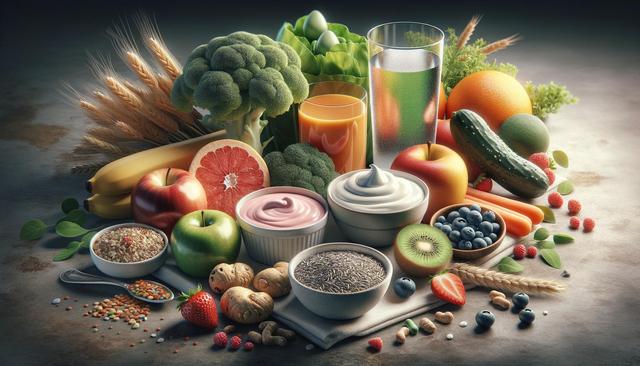How to Clean Out Your Gut: A Simple Guide to Digestive Health
Supporting your digestive health starts with good habits. This guide explores natural ways to reset your gut—from fiber-rich foods and hydration to probiotics and mindful eating. Learn how small changes can promote better digestion, energy, and overall well-being. Always consult a healthcare provider for personalized advice.

Understanding Your Gut and Why It Matters
Your gut plays a central role in your overall health, influencing everything from digestion and nutrient absorption to immune function and mood. An imbalanced gut can lead to common issues like bloating, fatigue, irregular bowel movements, and even skin problems. The gastrointestinal tract is home to trillions of bacteria—collectively known as the gut microbiome—which help break down food, produce vitamins, and fight harmful pathogens. When these microbes are out of balance, your digestive system can become sluggish or irritated, making it important to support gut health consistently through diet and lifestyle.
Cleaning out your gut doesn’t mean extreme detoxes or restrictive diets. Instead, it refers to nurturing your digestive system through natural, sustainable habits that encourage regularity and a healthy microbiome. This includes eating fiber-rich foods, staying hydrated, reducing processed foods, and incorporating fermented foods and probiotics. These steps help the body function as it should and allow the gut to ‘reset’ over time.
Increase Your Fiber Intake
Fiber is one of the most effective tools for supporting gut health. It acts like a broom for your digestive tract, helping to push waste through your system and feed beneficial gut bacteria. There are two main types of fiber—soluble and insoluble—and both play important roles in digestion. Soluble fiber dissolves in water and helps regulate blood sugar and cholesterol, while insoluble fiber adds bulk to stool and promotes regular bowel movements.
Good sources of fiber include:
- Whole grains like oats, quinoa, and brown rice
- Legumes such as lentils, chickpeas, and black beans
- Vegetables like broccoli, carrots, and leafy greens
- Fruits such as apples, pears, and berries
- Nuts and seeds, especially chia and flaxseeds
Start by gradually increasing fiber in your diet to avoid discomfort, and drink plenty of water to help fiber move efficiently through your digestive system. Aiming for at least 25–30 grams of fiber daily can significantly improve gut function over time.
Stay Hydrated for Effective Digestion
Water is essential for every part of the body, especially the digestive system. Adequate hydration helps break down food, absorb nutrients, and soften stool, making elimination smoother and more regular. Dehydration, on the other hand, can lead to constipation and sluggish digestion, which may cause discomfort and bloating.
To support your gut, aim to drink enough water throughout the day. A general guideline is about eight 8-ounce glasses, but individual needs can vary based on activity level, climate, and body size. In addition to water, you can stay hydrated with:
- Herbal teas like peppermint or ginger, which may also soothe digestion
- Fruits and vegetables with high water content, such as cucumbers, oranges, and watermelon
- Broths or clear soups that provide both fluids and electrolytes
Try to reduce consumption of dehydrating beverages like alcohol and sugary sodas, as these can counteract hydration and contribute to digestive discomfort.
Incorporate Probiotics and Fermented Foods
Probiotics are live microorganisms that support a healthy balance of gut bacteria. They can help restore the microbiome, especially after illness or antibiotic use, and may improve symptoms like bloating, irregularity, and gas. Fermented foods naturally contain probiotics and can be a simple addition to your daily meals.
Examples of probiotic-rich foods include:
- Yogurt with live cultures
- Kefir, a fermented milk drink
- Sauerkraut and kimchi
- Miso and tempeh
- Kombucha, a fermented tea
If you prefer supplements, look for a broad-spectrum probiotic with a variety of strains. However, food sources are a great way to introduce probiotics naturally. Pay attention to how your body responds, as some people may need to start with small amounts to avoid temporary digestive changes.
Practice Mindful Eating and Reduce Stress
How you eat can be just as important as what you eat. Rushed meals, overeating, and eating under stress can disrupt digestion. Mindful eating encourages you to slow down, chew thoroughly, and be present during meals, all of which support better nutrient absorption and gut function.
To eat more mindfully:
- Take a few deep breaths before meals to relax your nervous system
- Focus on your food and avoid distractions like screens
- Chew each bite thoroughly to aid mechanical digestion
- Listen to hunger and fullness cues rather than eating out of habit
Chronic stress can also negatively impact the gut by altering the microbiome, increasing inflammation, and slowing digestion. Incorporating stress-reducing practices like deep breathing, yoga, meditation, or regular physical activity can have a noticeable effect on your digestive health over time.